If you’re looking for the best Bluetooth OBD2 scanners in 2025, I recommend checking out options like BlueDriver, OBDLink MX+, Veepeak BLE+, and Vgate iCar Pro. These devices support major vehicle protocols, connect easily via Bluetooth, and work with popular apps for real-time data and diagnostic trouble codes. They’re reliable for DIY fixes and professional use alike. Keep reading to see my top picks and find the perfect scanner for your needs.
Key Takeaways
- Compatibility with vehicles from 1996/1998 onward, including hybrids and EVs, ensuring broad coverage in 2025.
- Support for multiple protocols and Bluetooth versions (BLE, 5.0, Classic) for stable, quick wireless connections across devices.
- Compatibility with popular apps like Torque, Carista, FORScan, and Jscan, offering comprehensive diagnostics without subscription fees.
- Compact, plug-and-play designs with user-friendly interfaces for quick setup and easy on-the-go troubleshooting.
- Features such as real-time data, trouble code clearing, and bi-directional controls tailored for DIYers and professionals alike.
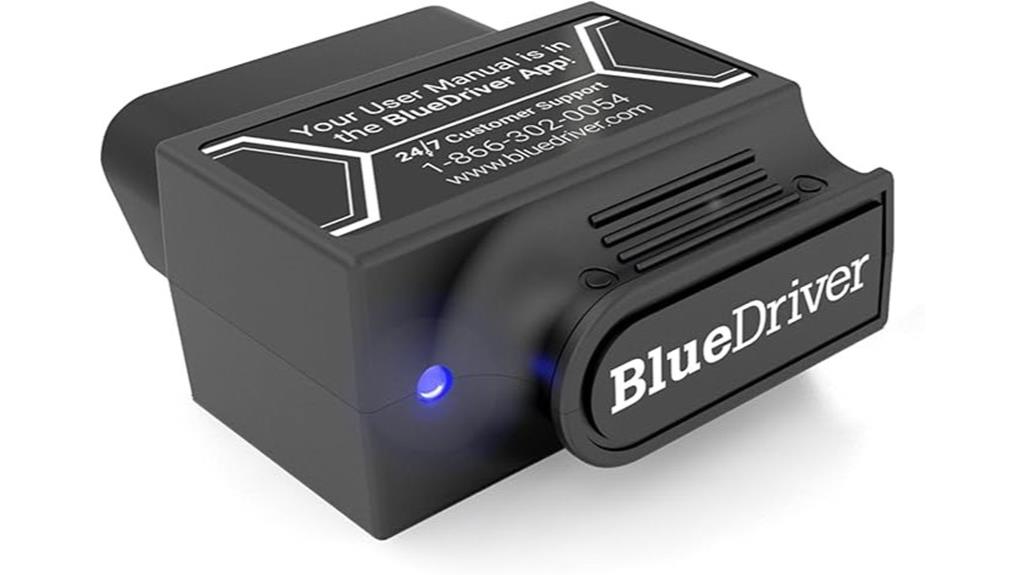
If you’re looking for a reliable and user-friendly diagnostic tool that works seamlessly with your iPhone or Android device, the BlueDriver Bluetooth Pro OBDII Scan Tool is an excellent choice. I’ve used it myself, and it connects via Bluetooth to a sensor plugged into your car’s OBDII port, supporting all gas-powered vehicles from 1996 onward. It reads and clears various trouble codes, offers real-time data, and provides vehicle-specific repair reports verified by ASE-certified pros. The app’s intuitive interface includes troubleshooting guides and exportable reports. Plus, it’s a one-time purchase with no subscription fees, making it a cost-effective, dependable solution for DIYers and professionals alike.
Best For: DIY car enthusiasts and professional technicians seeking a reliable, easy-to-use vehicle diagnostic tool compatible with iPhone and Android devices.
Pros:
- Supports all gas-powered vehicles from 1996 onward with comprehensive diagnostic features.
- No subscription fees; one-time purchase provides lifetime access to updates and features.
- User-friendly app with repair reports, troubleshooting guides, and real-time data monitoring.
Cons:
- Lacks bidirectional control, so it cannot perform functions like locking or unlocking doors.
- Requires an online connection for full functionality, which may be inconvenient in areas with poor connectivity.
- Firmware updates and database changes can occasionally affect diagnostic accuracy, though generally they improve performance.
Veepeak OBDCheck BLE Bluetooth OBD II Scanner
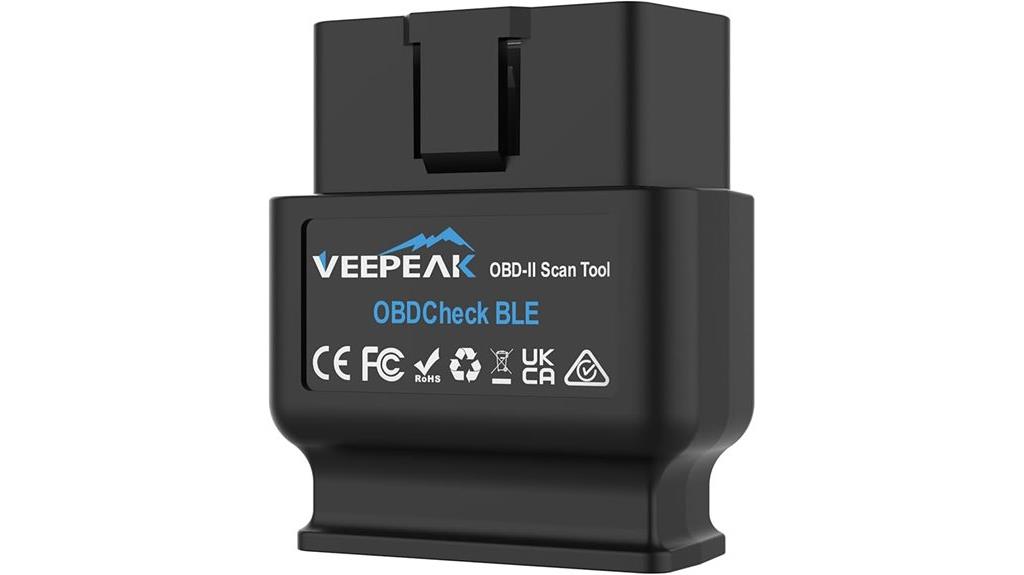
The Veepeak OBDCheck BLE Bluetooth OBD II Scanner stands out as an excellent choice for DIY enthusiasts and everyday drivers who want reliable, straightforward diagnostics without breaking the bank. It supports Bluetooth LE for iOS and Classic Bluetooth for Android, working with most 1996+ US cars and 1998+ Canadian vehicles. You can easily read and clear trouble codes, view live data, and check emissions readiness. While advanced features like ABS or SRS depend on your vehicle and app, the device’s simple plug-and-play setup and broad app compatibility make it a versatile, user-friendly tool for basic diagnostics and maintenance monitoring.
Best For: DIY enthusiasts and everyday drivers seeking reliable, easy-to-use vehicle diagnostics on a budget with broad compatibility and straightforward setup.
Pros:
- Supports Bluetooth LE for iOS and Classic Bluetooth for Android, ensuring wide device compatibility
- Simple plug-and-play setup with clear instructions for quick diagnostics
- Compatible with numerous popular OBD apps, enhancing functionality and user experience
Cons:
- Limited advanced diagnostics like ABS, SRS, and service resets depending on vehicle and app capabilities
- Not suitable for vehicles older than 1996 for US models or pre-1998 for Canadian vehicles
- Some features and data may vary based on vehicle make, model, and app used
OBD2 Wireless Bluetooth Car Diagnostic Scanner for iOS & Android

The OBD2 Wireless Bluetooth Car Diagnostic Scanner stands out as an ideal choice for both DIY enthusiasts and everyday drivers who want quick, hassle-free vehicle diagnostics. It supports 9 protocols and offers extensive tests, including reading and clearing DTCs, live data streaming, and reset functions. Compatible with over 96% of car makes from 1996 onward, it connects seamlessly via Bluetooth 5.4 to iOS and Android devices, with an easy setup process. The free app provides clear code descriptions, troubleshooting tips, and real-time data visuals. Its reliable build, user-friendly interface, and broad compatibility make it a top, affordable tool for maintaining and diagnosing your vehicle yourself.
Best For: DIY car owners and everyday drivers seeking an affordable, easy-to-use diagnostic tool compatible with most vehicles from 1996 onward.
Pros:
- Supports 9 protocols and a wide range of tests including DTC reading, live data streaming, and performance monitoring
- Compatible with over 96% of car makes and models, including popular brands like Toyota, Honda, Ford, and BMW
- Features Bluetooth 5.4 for fast, reliable wireless connection and an intuitive app for clear diagnostics and troubleshooting
Cons:
- Some users report longer scan times compared to other scanners
- Limited detail on certain error codes, which may require additional research for complex issues
- Mobile app may have occasional connectivity or update issues, depending on device and OS version
OBDLink MX+ OBD2 Bluetooth Scanner for iPhone, Android, and Windows

Designed for automotive enthusiasts and professionals alike, the OBDLink MX+ stands out with its broad device compatibility, transforming iPhone, Android devices, and Windows PCs into powerful diagnostic tools. It supports popular apps like FORScan, Torque, Carista, and more, enabling detailed diagnostics and coding. With strong OEM support for brands like Ford, GM, Toyota, and Honda, it offers detailed insights, including Check Engine Light diagnostics and access to live parameters like ABS and SRS. The device also includes safety features such as over-voltage protection and firmware updates, ensuring reliable performance and compatibility across a wide range of vehicles.
Best For: automotive enthusiasts and professionals seeking a versatile, high-performance diagnostic scanner compatible with multiple devices and vehicle brands.
Pros:
- Supports a wide range of automotive diagnostics and coding applications such as FORScan, Torque, and Carista
- Compatible with iPhone, Android, and Windows, offering flexible device integration
- Provides comprehensive diagnostic information including Check Engine Light, ABS, SRS, and live parameters
Cons:
- May require familiarity with diagnostic software for optimal use
- Firmware updates and setup might be complex for some users unfamiliar with tech devices
- Advanced features and OEM support could be limited on some vehicle models
Veepeak Mini Bluetooth OBD II Scanner for Android

If you’re looking for an affordable, easy-to-use diagnostic tool for your vehicle, the Veepeak Mini Bluetooth OBD II Scanner is a great choice, especially for Android users. This compact device connects effortlessly to your car’s OBD II port and pairs with Android apps like Torque Lite/Pro and OBD Fusion. It reads engine codes, monitors live sensor data, and checks vehicle readiness, helping you identify issues quickly. Weighing just over an ounce, it’s portable and straightforward. While it doesn’t support iOS devices, it’s perfect for cars, trucks, PHEVs, and EVs (check compatibility). Many users find it reliable, cost-effective, and invaluable for DIY diagnostics.
Best For: Android vehicle owners seeking an affordable, portable diagnostic tool to read codes, monitor sensors, and verify vehicle health easily.
Pros:
- Compact, lightweight design weighing just over an ounce, making it highly portable.
- Compatible with popular Android apps like Torque Pro, OBD Fusion, and Car Scanner for comprehensive diagnostics.
- Cost-effective solution that helps identify issues early, verify vehicle condition, and save money on repairs.
Cons:
- Occasional Bluetooth disconnections during driving can lead to data loss.
- Not compatible with iOS devices, limiting use to Android platforms.
- May not support advanced diagnostics such as ABS or SRS for all vehicle models.
Veepeak OBDCheck BLE+ Bluetooth OBD II Scanner for iOS & Android
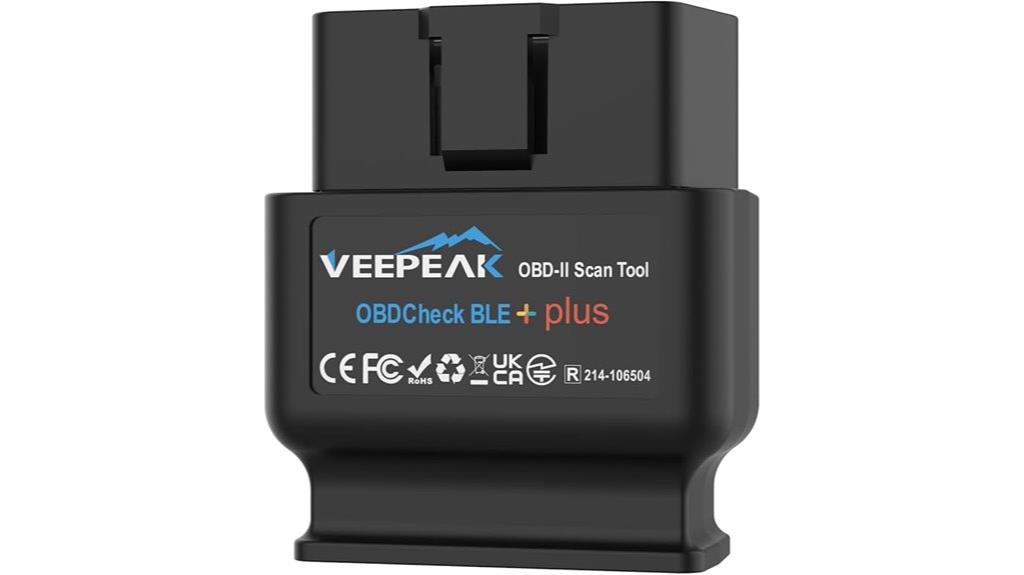
Veepeak OBDCheck BLE+ stands out as an ideal choice for DIY enthusiasts and everyday drivers seeking reliable, wireless diagnostic tools for their vehicles. It supports all brands, including hybrids and electric cars, since 1996 in the U.S. and 1998 in Canada, and works seamlessly with iOS and Android devices—though not with Android head units. The scanner provides essential features like trouble code reading, clearing, live data, and I/M readiness, with some advanced diagnostics available through specific apps. Its compact design and quick setup make it a practical, user-friendly tool, rated highly for ease of use and dependable performance.
Best For: DIY enthusiasts and everyday drivers seeking a reliable, wireless diagnostic tool compatible with most vehicles and smartphones.
Pros:
- Easy to set up and connect quickly via Bluetooth with minimal effort.
- Supports a wide range of vehicle makes, including hybrids and electric cars, since 1996/1998.
- Compact design with reliable performance and compatibility with popular third-party diagnostic apps.
Cons:
- Not compatible with Android head units or certain vehicle models like some BMWs.
- Advanced diagnostics and manufacturer-specific data may require additional apps or may be limited depending on vehicle.
- Does not support service resets or some manufacturer-specific functions on all vehicles.
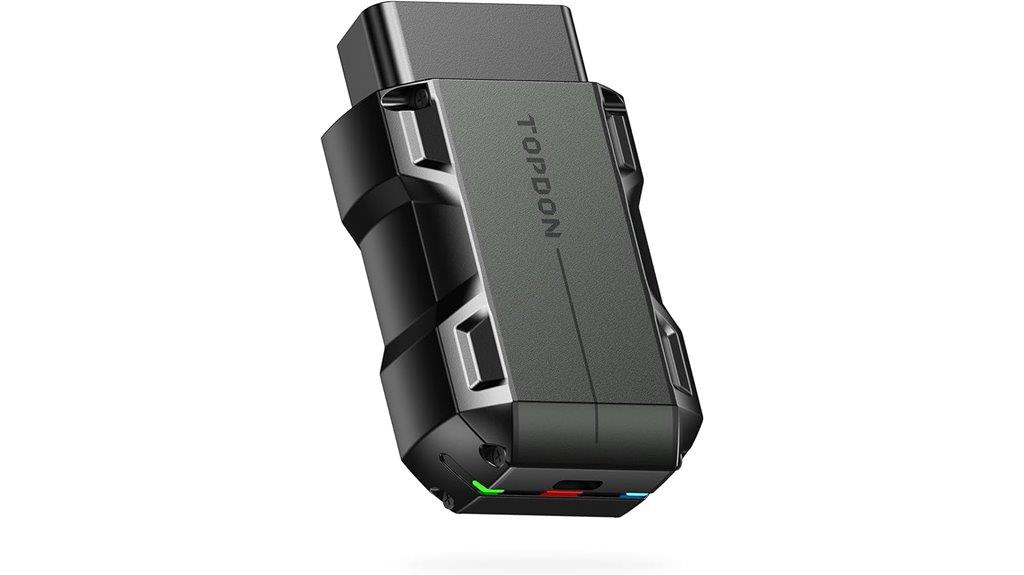
The TOPDON TopScan OBD2 Scanner Bluetooth stands out as an ideal choice for DIY enthusiasts and professional mechanics alike, thanks to its extensive diagnostic capabilities and wireless convenience. It supports full system diagnosis, including code reading and clearing, ECU info, real-time data, and active testing. With over 8 reset functions such as Oil Reset and DPF Regeneration, it covers a wide range of maintenance needs. Its bi-directional control allows quick commands from smartphones, and it supports more than 100 brands and 10,000 models. The Bluetooth 5.0 connection ensures easy pairing, while the app offers detailed data analysis and online updates, making diagnostics straightforward and efficient.
Best For: DIY car owners and professional mechanics seeking a comprehensive, wireless OBD2 diagnostic tool with extensive vehicle compatibility and real-time data analysis.
Pros:
- Supports full system diagnosis, including code reading, clearing, and active testing
- Wireless Bluetooth 5.0 connection for quick pairing and enhanced mobility
- Compatible with over 100 car brands and more than 10,000 vehicle models
Cons:
- Subscription options may be necessary for full access to certain features after the first year
- Requires a compatible smartphone (iOS or Android) for full functionality
- Some advanced functions, like FCA gateway access, require a user account and additional setup
OBD2 Bluetooth Scanner for Cars
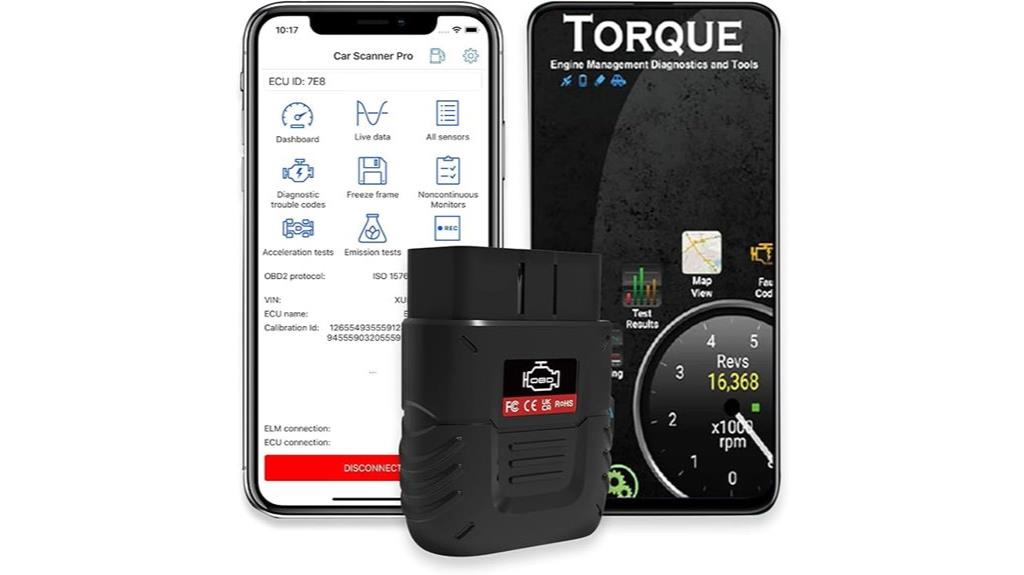
For DIY car owners and enthusiasts seeking an affordable yet reliable diagnostic tool, the OBD2 Bluetooth Scanner for Cars delivers quick, accurate fault code readings and live data streaming. It’s compact, compatible with most vehicles 1996 and newer, and easy to use—just plug it in, pair via Bluetooth, and launch the app. It offers detailed fault codes, live sensor data, and tests like oxygen sensors and battery voltage. Upgraded chips improve connection stability and speed, making diagnostics faster. Customers find it practical for monitoring vehicle health, preventing costly repairs, and performing small fixes independently. It’s a cost-effective tool that simplifies car troubleshooting without complex setups.
Best For: DIY car owners and enthusiasts seeking an affordable, reliable diagnostic tool to monitor vehicle health and troubleshoot issues easily.
Pros:
- Compact, user-friendly design with plug-and-play setup and no complex installation required
- Provides quick, accurate fault codes, live data streaming, and essential vehicle information
- Upgraded chip enhances connection stability and speeds up diagnostics by 80%
Cons:
- App functionality can be limited or unreliable, with occasional connectivity issues
- Unable to reset engine warning lights directly through the app
- May lack advanced features found in higher-cost diagnostic devices

If you’re looking for a reliable way to diagnose your vehicle using your Android device, the Panlong OBD2 Bluetooth Scanner is an excellent choice. Fully ELM327 compliant, it supports nine OBDII protocols, making it compatible with vehicles from 1996 onwards, including US, EU, Asian, and newer domestic/import models. It reads and clears error codes, displays sensor data, and turns off the Check Engine Light, helping you troubleshoot issues independently. Designed specifically for Android phones and tablets, it works seamlessly with popular apps like Torque and Car Scanner. This tool simplifies vehicle diagnostics, saves money, and offers broad compatibility for a variety of vehicles.
Best For: Android vehicle owners seeking an affordable, reliable, and easy-to-use diagnostic tool to troubleshoot and monitor their car’s systems independently.
Pros:
- Fully compliant with ELM327 standards, ensuring broad vehicle compatibility
- Supports multiple protocols for use with various car makes and models from 1996 onward
- Compatible with popular Android apps like Torque, Car Scanner, and OBD Auto Doctor for versatile use
Cons:
- Only compatible with Android devices; does not support iOS platforms
- Requires users to download and install third-party apps for full functionality
- May have limited features on some vehicle models or newer systems that require manufacturer-specific diagnostics
ANCEL AD310 OBD II Scanner for Car Engine Fault Codes
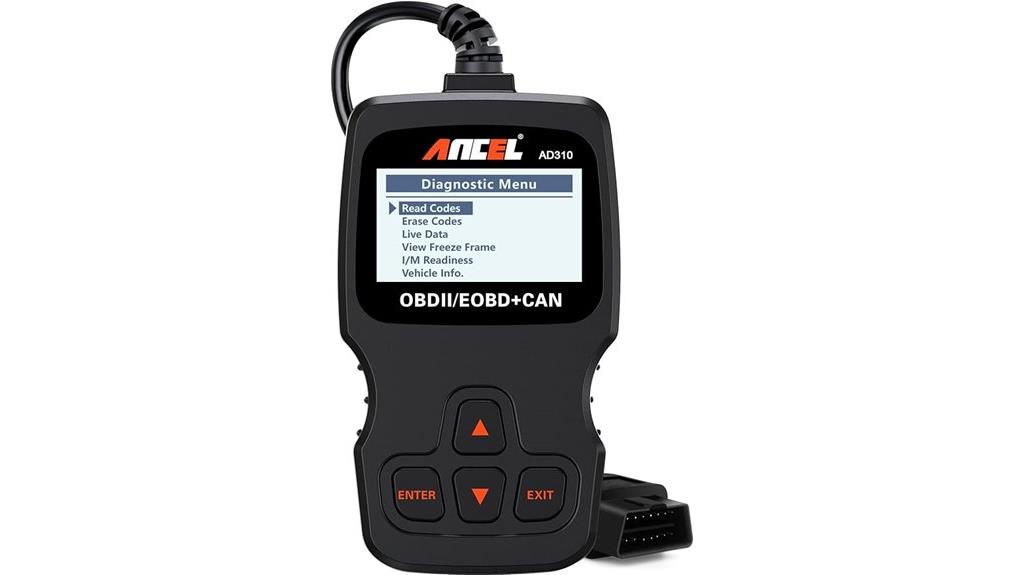
Looking for an affordable, easy-to-use scanner that quickly identifies and clears engine fault codes? The ANCEL AD310 OBD II Scanner is a popular choice, recommended by Scotty Kilmer. It reads and clears error codes, shows live data, and provides vehicle info, all in a compact, lightweight design. Supporting vehicles from 1996 onward across US, EU, and Asian models, it’s simple to operate without batteries—drawing power directly from the OBDII port. With a clear display and durable build, it offers fast, reliable diagnostics for home or travel use. Many users find it essential for detecting issues early and avoiding costly repairs.
Best For: DIY car owners and travelers seeking an affordable, reliable, and easy-to-use diagnostic tool for quick engine fault code readings and clearance from 1996 models onward.
Pros:
- Supports a wide range of vehicles across US, EU, and Asian markets without needing batteries or chargers.
- Features a clear, large display and simple interface suitable for both amateurs and professionals.
- Fast and accurate at reading and clearing codes, helping save time and repair costs.
Cons:
- Clearing codes does not fix underlying issues, which may require professional repair.
- Some OEM-specific or manufacturer-specific codes may not be fully supported or retrievable.
- Manual instructions may be slightly misleading regarding code clearance procedures and reset times.
OBD2 Bluetooth Scanner for Cars
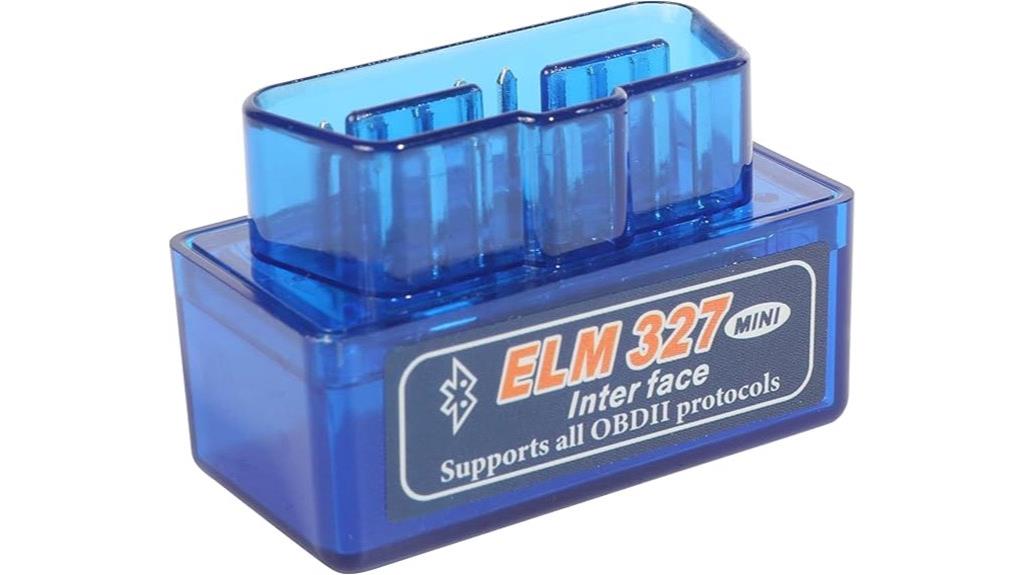
Wondering how to quickly diagnose your car’s issues without visiting a mechanic? An OBD2 Bluetooth Scanner for Cars might be just what you need. It’s compatible with Android, Symbian, and Windows devices, supporting apps like Torque and Scan Master ELM. Just plug it into your car’s OBD2 port, turn on Bluetooth, and connect your device—diagnosing engine problems, reading trouble codes, and monitoring essential data like coolant temperature or vehicle speed. Setup takes minutes, making it perfect for beginners. This affordable tool turns your smartphone or tablet into a professional diagnostic device, saving time and money while keeping your car running smoothly.
Best For: automotive enthusiasts, DIY car owners, and professional mechanics seeking an affordable and easy-to-use diagnostic tool compatible with multiple devices and software platforms.
Pros:
- Compatible with Android, Symbian, and Windows devices, supporting various diagnostic apps like Torque and Scan Master ELM.
- Simple setup process that takes only minutes, suitable for beginners and experienced users alike.
- Enables quick access to a wide range of vehicle data, including trouble codes, engine parameters, and emissions information.
Cons:
- May require additional apps and Bluetooth connection setup, which could be challenging for some users.
- Limited compatibility with vehicles manufactured before the OBD2 standard.
- Basic models might lack advanced diagnostic features available in professional-grade tools.
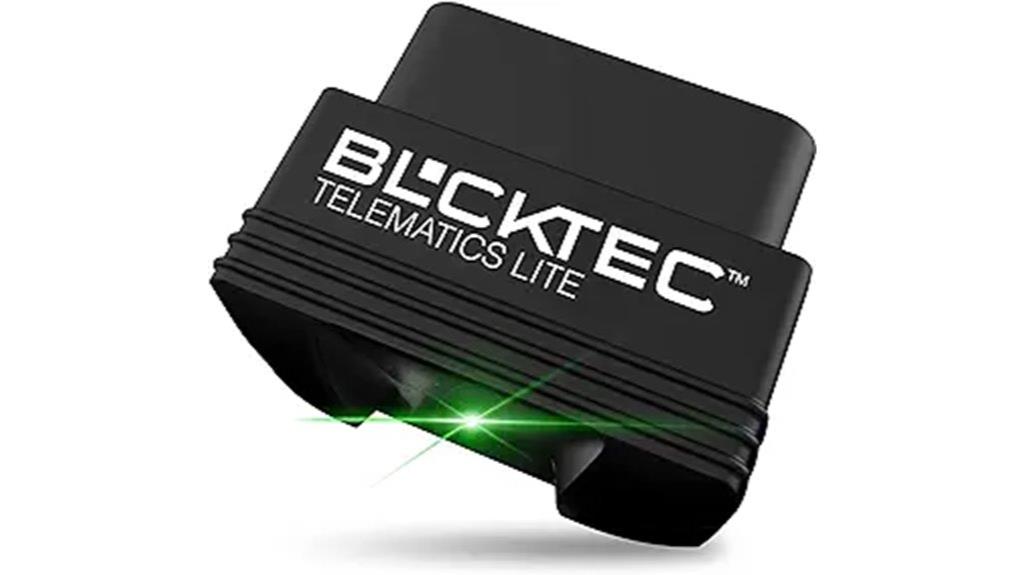
The BLCKTEC 410 Bluetooth OBD2 Scanner stands out as an ideal choice for DIYers and automotive professionals who want reliable, on-the-spot diagnostics without breaking the bank. It easily connects to iOS and Android devices via Bluetooth, supporting vehicles from 1996 onward, including cars, trucks, and SUVs. Compact and lightweight, it offers functions like code reading, resetting, live data, and battery checks. With a precise OEM and OBD2 database, it guarantees accurate results. Best of all, there are no hidden fees—lifetime updates come with a single purchase. Despite some connectivity quirks, it’s a versatile, cost-effective tool for everyday diagnostics.
Best For: DIY enthusiasts and automotive professionals seeking affordable, reliable, and easy-to-use diagnostics for a wide range of vehicles from 1996 onward.
Pros:
- Supports both iOS and Android smartphones via Bluetooth for seamless connectivity.
- Provides accurate, real-time data and comprehensive code reading and resetting functions.
- No hidden fees; lifetime updates included with a single purchase, ensuring cost-effectiveness.
Cons:
- Some users experience connectivity issues, especially with older vehicle models.
- Pairing process can be sluggish, requiring repeated input of vehicle information.
- App interface may be less intuitive, necessitating self-guided troubleshooting and learning.
OBDII Car Diagnostic Scanner, Bluetooth Code Reader
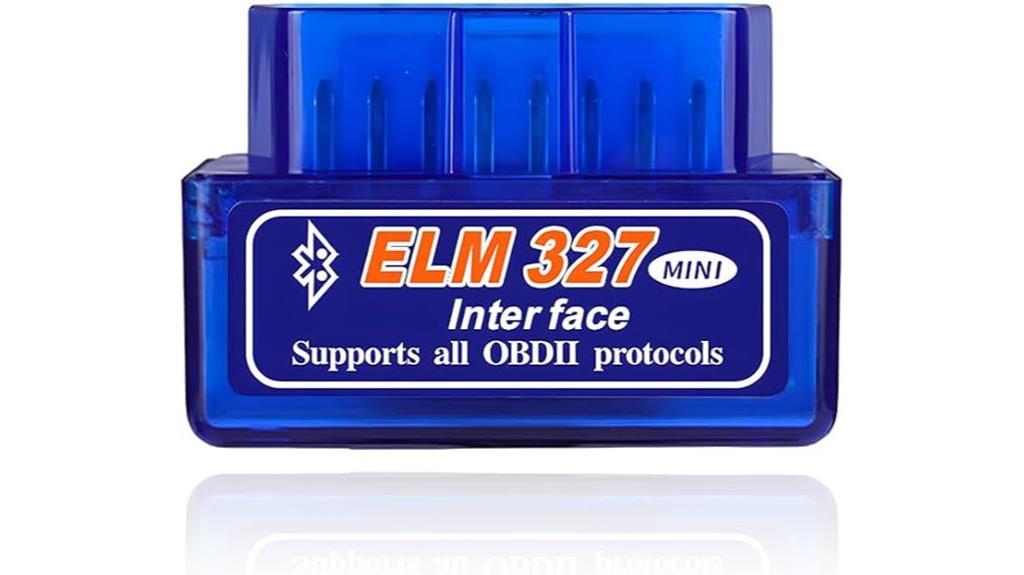
If you’re a DIY enthusiast or a professional mechanic seeking an affordable and portable diagnostic tool, the OBDII Car Diagnostic Scanner with Bluetooth code reader by KVAEY is an excellent choice. It supports most 12V vehicles (excluding hybrids and electric models) and connects seamlessly via Bluetooth to Android and iOS devices using apps like Torque. Compact and lightweight at just 0.88 ounces, it’s easy to install and use on the go. With 17 functions, including fault code reading, engine monitoring, and diagnostics, it helps you identify issues quickly. Its durable ABS build guarantees long-term reliability, making it a practical addition to any toolbox.
Best For: DIY car enthusiasts and professional mechanics seeking an affordable, portable Bluetooth diagnostic tool compatible with most 12V vehicles.
Pros:
- Supports a wide range of diagnostic functions including fault code reading and engine monitoring.
- Compact, lightweight, and easy to install, making it ideal for on-the-go use.
- Compatible with popular mobile apps like Torque on both Android and iOS devices.
Cons:
- Limited to 12V vehicles and excludes hybrids and electric models.
- May have compatibility issues with certain vehicle brands, such as Ford.
- Provides read-only diagnostics without the ability to modify vehicle settings.
OBD2 Bluetooth Scanner for Android and Windows
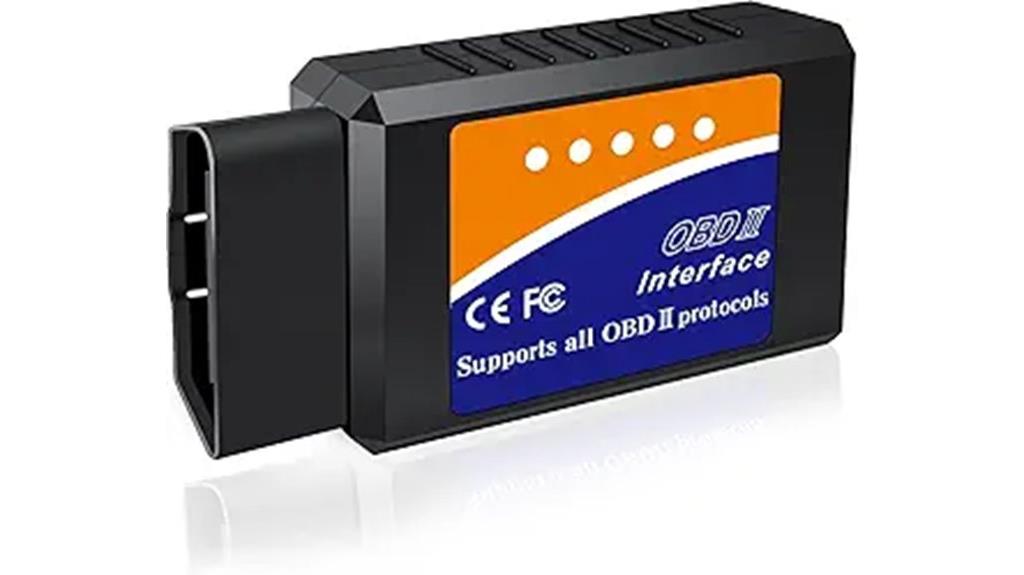
OBD2 Bluetooth Scanners for Android and Windows are ideal for DIY enthusiasts and everyday drivers who want to diagnose their vehicle easily and affordably. These devices support most cars from 1996 onward, including many popular brands like BMW, Ford, Honda, and Toyota. They connect via Bluetooth and work with free apps, providing real-time data, code reading, and clearing trouble codes. While mostly straightforward, some users face initial setup challenges, especially on iOS. Overall, they offer a compact, lightweight solution with a 2-year warranty, making vehicle diagnostics accessible without breaking the bank. Proper setup guarantees smooth operation and reliable results.
Best For: DIY car enthusiasts and everyday drivers seeking an affordable, easy-to-use diagnostic tool for most 1996+ vehicles on Android and Windows.
Pros:
- Supports a wide range of vehicles from 1996 onward, including popular brands like BMW, Ford, Honda, and Toyota.
- Provides real-time data, code reading, and clearing trouble codes via a free app.
- Compact, lightweight design with a 2-year warranty and user-friendly interface.
Cons:
- Initial setup can be challenging, especially on iOS devices, requiring careful configuration.
- Compatibility issues reported with iPhones and iPads, affecting seamless connection.
- Some users experience connectivity and security concerns, such as virus alerts.
Vgate iCar Pro Bluetooth OBD2 Fault Code Reader for iOS/Android

Designed for DIY enthusiasts and vehicle owners seeking an easy, wireless way to diagnose and monitor their cars, the Vgate iCar Pro Bluetooth OBD2 Fault Code Reader supports both iOS and Android devices with minimal setup. This compact device plugs into most OBDII ports in vehicles made over the past two decades and uses Bluetooth 4.0 BLE for low power consumption. It offers real-time data, code reading and clearing, and compatibility with popular apps like Torque, OBD Fusion, and Jscan. While it’s simple to use and upgrade firmware via your phone or PC, some features may require app licenses, and vehicle compatibility varies.
Best For: DIY vehicle owners and car enthusiasts seeking an affordable, easy-to-use Bluetooth OBD2 scanner for basic diagnostics and real-time monitoring across most 12V petrol and light diesel vehicles.
Pros:
- Supports multiple popular apps like Torque, OBD Fusion, and Jscan for versatile diagnostics and customization.
- Low power Bluetooth 4.0 BLE design with auto sleep/wake for extended device life.
- Compact, plug-and-play design compatible with a wide range of vehicles made after 1996.
Cons:
- Some features require app licenses or paid upgrades, limiting full functionality.
- Bright Bluetooth LED can be distracting and may affect night driving.
- Compatibility issues with certain vehicle models and limited advanced diagnostic capabilities, especially on electric or hybrid cars.
Factors to Consider When Choosing OBD2 Bluetooth Scanners
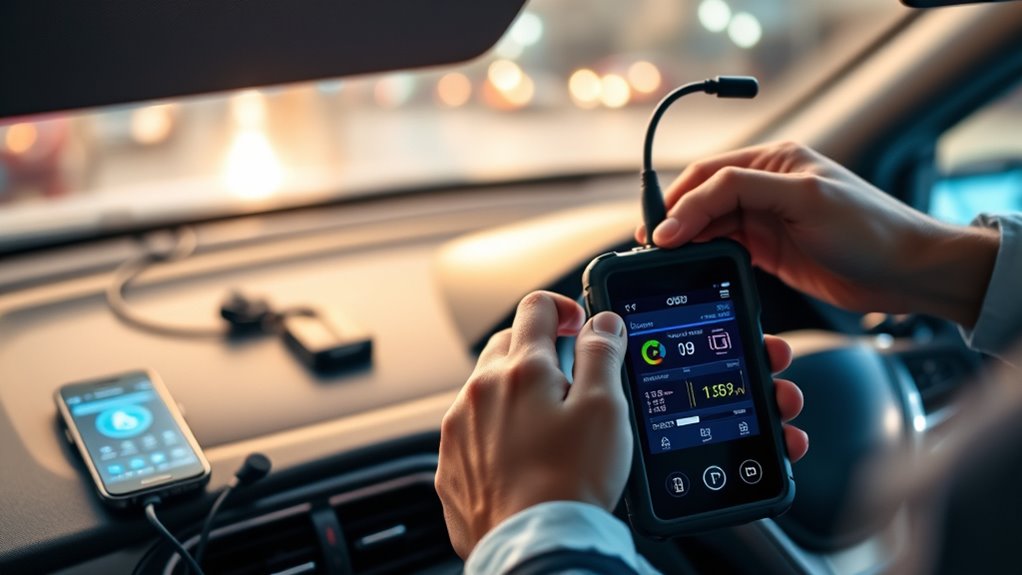
When selecting an OBD2 Bluetooth scanner, I focus on key factors that impact performance and usability. Compatibility with my vehicle, app features, and connection stability are essential for a smooth experience. I also consider diagnostic capabilities and the device’s build quality to guarantee it lasts and meets my needs.
Compatibility With Vehicles
Are you confident that your Bluetooth scanner will work with your vehicle? It’s vital to check compatibility before buying. First, confirm your vehicle was manufactured from 1996 onward in the US or 1998+ in Canada, as these are standard cutoff years for OBD2 compliance. Next, verify that the scanner supports your vehicle’s make, model, and engine type, especially if you own a hybrid or electric vehicle, which might have limited support. Also, make sure it supports the specific protocols your car uses, like ISO 15765 CAN or ISO 9141-2. Compatibility with your mobile device’s OS and Bluetooth version is essential too. Reading manufacturer specs and user reviews helps guarantee the scanner can access all relevant vehicle systems and data features.
App Support & Features
Ever wondered if the app that comes with your Bluetooth OBD2 scanner will meet your diagnostic needs? It’s essential to check if the app supports your device’s operating system—iOS or Android—to access all features. Look for apps that offer detailed error code descriptions, live data monitoring, and troubleshooting guidance for thorough diagnostics. Some apps go beyond basic functions, providing vehicle performance analysis, reset capabilities, or specialized tests like ABS, SRS, or TPMS, which can be crucial depending on your needs. Also, consider whether the app is regularly updated to improve stability, expand vehicle coverage, and introduce new features. Keep in mind, advanced diagnostics or customization options might require paid licenses or subscriptions, so factor that into your decision.
Connection Stability & Speed
A stable Bluetooth connection is essential for reliable data transmission during diagnostics, preventing frustrating disconnections that can disrupt your workflow. Higher Bluetooth versions, like 4.0 BLE or 5.0, typically offer faster pairing and data transfer, improving overall performance. Devices with advanced hardware and optimized firmware process vehicle data more quickly, reducing lag in live data monitoring. However, connection speed can be affected by interference from other wireless devices or obstacles between the scanner and your phone or tablet. Regular firmware updates from the manufacturer can also enhance stability and data transfer speeds over time. When choosing a scanner, prioritize those with the latest Bluetooth technology and good hardware specs to ensure a smooth, uninterrupted diagnostic experience.
Diagnostic Capabilities
When choosing an OBD2 Bluetooth scanner, understanding its diagnostic capabilities is crucial to guarantee it meets your needs. I look for devices that can read and clear a broad range of trouble codes, including generic, manufacturer-specific, and pending codes. Real-time data monitoring is essential, so I check if the scanner provides live parameters like engine RPM, coolant temp, vehicle speed, and sensor voltages. Enhanced diagnostics, such as freeze frame data, emission readiness status, and technical service bulletins, add value. I also consider if the device supports active testing or bi-directional control to send commands for troubleshooting. Ultimately, compatibility with my vehicle’s make, model, and year ensures I access all relevant diagnostic functions, making the scanner a versatile tool for extensive vehicle health checks.
Device Build & Durability
Choosing a durable OBD2 Bluetooth scanner requires attention to its construction and materials, as these determine how well it withstands the demanding conditions of automotive use. Look for scanners with a robust housing made from impact-resistant, flame-retardant materials like ABS or polycarbonate, which can handle bumps and heat. Water and dust resistance ratings, such as IP65 or IP67, are essential, ensuring the device can resist moisture and particulate intrusion. A compact, lightweight design makes handling easier and reduces damage risk during use or transport. Secure connection ports and reinforced cable attachments prevent wear over time, maintaining consistent performance. Quality build standards, including sealed connectors and strain reliefs, add to the device’s reliability, making it a smart investment for long-term durability.
Ease of Use
Ease of use is essential when selecting an OBD2 Bluetooth scanner, as a device that’s simple to operate saves time and reduces frustration. A plug-and-play design that requires minimal setup is ideal—just connect it to your vehicle’s OBDII port and pair via Bluetooth. Intuitive mobile apps with clear interfaces and step-by-step instructions make it easy for beginners to read codes and monitor data without confusion. Compatibility with both iOS and Android devices, along with automatic or minimal configuration connections, ensures seamless operation. Features like automatic Bluetooth pairing, indicator lights, and minimal button presses further streamline the process. Overall, a user-friendly scanner minimizes hassle, allowing you to diagnose issues quickly and confidently, even if you’re new to car diagnostics.
Cost & Subscription Fees
Cost and subscription fees are key factors to contemplate because they directly impact your overall expenses and long-term value. Many OBD2 Bluetooth scanners offer lifetime use with a one-time purchase, giving you full access to features without ongoing costs. However, some models require subscriptions or app fees to unlock advanced diagnostics or software updates. While free or low-cost apps are common, premium features like detailed repair reports often come with extra charges. Devices that include free firmware updates help maintain compatibility and enhance functionality without additional costs over time. It’s crucial to verify whether updates and app features are included in the purchase or if they’ll cost extra. This ensures you choose a scanner that fits your budget while providing the features you need.
Compatibility With Devices
Since compatibility issues can prevent your scanner from working properly, it’s vital to verify the device supports your specific operating system, whether that’s iOS, Android, or Windows. Check if the scanner supports the Bluetooth version your device uses, like Bluetooth 4.0, BLE, or Bluetooth 5.4, to ensure smooth pairing and communication. Also, confirm that the scanner works with the apps you plan to use, as app compatibility can vary across platforms. For iOS devices, look for models that support Bluetooth Low Energy (BLE), often connecting directly within the app. Additionally, consider if the scanner allows firmware updates via your device or PC, which helps maintain compatibility with new vehicle protocols and features over time. Being thorough now saves headaches later.
Frequently Asked Questions
How Do I Update OBD2 Bluetooth Scanner Firmware?
Updating your OBD2 Bluetooth scanner firmware is pretty straightforward. First, connect your scanner to your computer or smartphone following the manufacturer’s instructions. Then, visit their official website or app to check for firmware updates. Download the latest version, and follow the on-screen prompts to install it. Make sure your device stays connected during the process to avoid any issues. Once done, your scanner will be up-to-date and ready for use.
Are OBD2 Bluetooth Scanners Compatible With All Vehicle Makes and Models?
Imagine a universal translator for cars—sounds perfect, right? Well, OBD2 Bluetooth scanners aren’t quite that magical. While most work with many makes and models, they’re not compatible with everything under the sun. I’ve found some work seamlessly with popular brands, but a few might leave you hanging. Always check the scanner’s compatibility list before buying, or you’ll end up talking to a very silent car.
Can These Scanners Diagnose ABS, Airbag, or Transmission Issues?
I’ve found that most basic OBD2 Bluetooth scanners primarily diagnose engine and emissions-related issues. However, some advanced models can also read ABS, airbag, and transmission codes. If you want to check those systems, look for scanners specifically labeled as supporting full system diagnostics. I recommend verifying compatibility with your vehicle’s make and model before purchasing to guarantee it covers the features you need.
What Is the Typical Battery Life of Portable Bluetooth OBD2 Scanners?
Think of a portable Bluetooth OBD2 scanner like a loyal pet—always ready to serve when needed. Typically, these devices last between 8 to 12 hours on a single charge, depending on usage and model. I’ve found that moderate use and turning off the scanner when not in use can stretch the battery life longer. It’s pretty handy, making sure your diagnostics are always within reach without constantly recharging.
Do Bluetooth Scanners Work With Third-Party Diagnostic Apps?
Yes, Bluetooth scanners often work with third-party diagnostic apps, but it depends on the scanner’s compatibility. I’ve found that many devices support popular apps like Torque, DashCommand, or OBDLink. Just make sure to check the scanner’s specifications and app compatibility before buying. This way, I can customize my diagnostic experience and access a broader range of features beyond the manufacturer’s default software.
Conclusion
So, after all this, I guess choosing the right OBD2 Bluetooth scanner is just a breeze—if you enjoy endless options and a sprinkle of tech confusion. Who knew diagnosing your car could be so simple yet overwhelming? But hey, with these top picks, you’re practically a mechanic in disguise. Just don’t forget to actually read the codes before turning into a DIY genius—your car might thank you later, or not.

